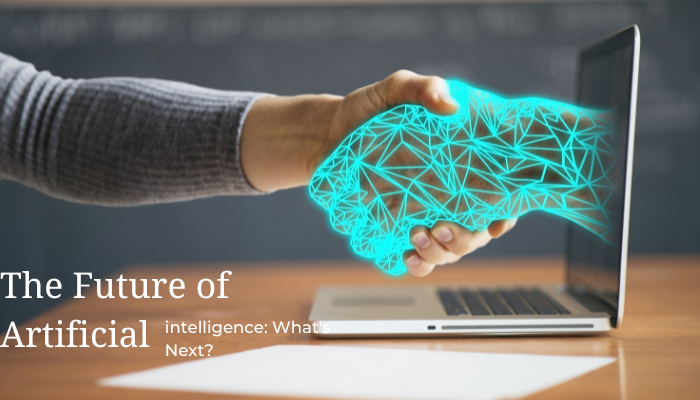Artificial Intelligence (AI) has rapidly evolved from a futuristic concept to a transformative force across various industries. As we move further into the 21st century, the potential of AI continues to grow, promising innovations that could reshape our world. This article explores the future of AI, focusing on upcoming advancements and their potential impacts on society.
The Evolution of AI
To understand the future of AI, it’s essential to look back at its evolution. Early AI systems, developed in the mid-20th century, were primarily rule-based and capable of performing specific tasks. These systems laid the groundwork for the development of machine learning algorithms, which have significantly advanced AI capabilities.
From Rule-Based Systems to Machine Learning
Rule-based systems relied on predefined rules and logic to perform tasks, but they lacked flexibility and adaptability. Machine learning, a subset of AI, introduced algorithms that could learn from data and improve over time without explicit programming. This shift allowed AI systems to handle more complex and dynamic tasks.
The Rise of Deep Learning
Deep learning, a branch of machine learning, has been a game-changer in AI development. It involves neural networks with multiple layers that can process vast amounts of data and recognize patterns with high accuracy. This technology has been instrumental in breakthroughs such as image and speech recognition, natural language processing, and autonomous vehicles.
Current State of AI
Today, AI is ubiquitous, embedded in everyday applications and services. From virtual assistants like Siri and Alexa to recommendation algorithms on streaming platforms and e-commerce websites, AI enhances user experiences and optimizes operations.
AI in Healthcare
One of the most promising applications of AI is in healthcare. AI algorithms can analyze medical images, predict disease outbreaks, and personalize treatment plans. For instance, IBM’s Watson Health uses AI to assist doctors in diagnosing and treating patients more accurately.
AI in Finance
In the financial sector, AI is used for fraud detection, algorithmic trading, and customer service. AI-driven chatbots handle customer inquiries, while machine learning models analyze transaction data to identify suspicious activities.
AI in Transportation
The transportation industry has seen significant advancements with the introduction of autonomous vehicles. Companies like Tesla and Waymo are developing self-driving cars that could revolutionize how we travel, reducing accidents and improving traffic flow.
What’s Next for AI?
As AI continues to advance, several key trends and developments are expected to shape its future.
1. Explainable AI (XAI)
One of the primary challenges with current AI systems is their lack of transparency. Explainable AI (XAI) aims to address this issue by making AI decision-making processes more understandable to humans. XAI will be crucial in sectors like healthcare and finance, where understanding the reasoning behind AI decisions is essential.
2. AI Ethics and Regulation
As AI systems become more integrated into society, ethical considerations and regulatory frameworks will play a crucial role. Ensuring AI systems are fair, transparent, and unbiased is vital to prevent discrimination and misuse. Governments and organizations will need to collaborate to establish guidelines and standards for AI development and deployment.
3. AI in Creative Fields
AI is set to revolutionize creative industries such as art, music, and writing. Generative AI models can create original artwork, compose music, and even write stories. These tools will augment human creativity, offering new possibilities for artists and creators.
4. Enhanced Human-AI Collaboration
Future AI systems will likely focus on enhancing human capabilities rather than replacing them. Collaborative robots (cobots) will work alongside humans in various industries, from manufacturing to healthcare, improving efficiency and safety. AI-powered tools will also assist professionals in making better decisions by providing insights and recommendations.
5. AI in Education
AI has the potential to transform education by personalizing learning experiences. Adaptive learning platforms can tailor educational content to individual students’ needs, improving learning outcomes. AI tutors and chatbots can provide additional support, making education more accessible.
The Impact of AI on Society
While the future of AI holds immense promise, it also raises important questions about its impact on society.
Job Displacement and Creation
One of the most significant concerns is the potential for job displacement due to automation. While AI will automate certain tasks, it will also create new job opportunities. For instance, the rise of AI has led to increased demand for data scientists, AI engineers, and machine learning specialists. Preparing the workforce for these changes through reskilling and upskilling programs will be crucial.
Privacy and Security
As AI systems collect and analyze vast amounts of data, privacy and security concerns will become more prominent. Ensuring data protection and preventing unauthorized access will be critical to maintaining public trust in AI technologies.
Social and Economic Inequality
AI has the potential to exacerbate social and economic inequalities if not properly managed. Access to AI technologies and the benefits they bring should be equitable to avoid widening the gap between different socioeconomic groups. Policies and initiatives aimed at promoting digital inclusion will be essential.
Conclusion
The future of artificial intelligence is filled with exciting possibilities and challenges. As AI continues to evolve, it will undoubtedly reshape industries, enhance human capabilities, and transform society. However, realizing the full potential of AI will require careful consideration of ethical, social, and economic implications. By fostering collaboration between governments, organizations, and individuals, we can ensure that AI develops in a way that benefits all of humanity.
